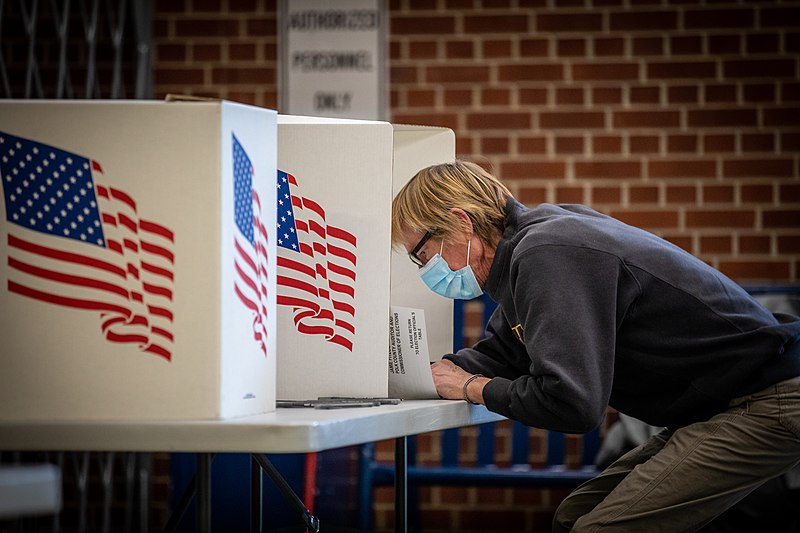
Bob Vallier, a long-time resident of Paris who has lived outside the U.S. for nearly 30 years, has already cast his vote for Michigan in the upcoming November 5th election.
"I understand how what's decided in America impacts the rest of the world because I've experienced life outside of it," says Vallier, chair of the LGBTQ+ caucus for Democrats Abroad.
Vallier's vote, along with others cast by Americans living overseas, could be pivotal in determining outcomes in key battleground states like Michigan. The state is one of the most fiercely contested in the election, with polls showing a narrow lead for Democratic candidate Kamala Harris over Republican candidate Donald Trump.
The Democratic National Committee (DNC) estimates that 1.6 million Americans living abroad are eligible to vote in critical swing states, including Arizona, Georgia, Michigan, Nevada, North Carolina, Pennsylvania, and Wisconsin—states that will likely decide the election's outcome.
These voters tend to lean Democratic. In the 2020 election, three-quarters of those using Vote From Abroad—a nonpartisan tool linked to the DNC—identified as Democrats. Recognizing their importance, the DNC has, for the first time in a presidential race, allocated $300,000 to Democrats Abroad. This funding supports voter registration efforts and mail-in voting operations, and the group is actively running social media ads encouraging overseas Americans to submit their ballots.
"This election will be decided by slim margins, and every vote is crucial," said DNC spokesperson Maddy Mundy. "We're committed to engaging every eligible voter, regardless of where they live."
Trump’s Campaign Targets Tax Reform for Expats
Republican candidate Donald Trump is also seeking to win over American expatriates. Earlier this month, Trump pledged to eliminate the double taxation faced by U.S. citizens living abroad.
Though the Trump campaign has not elaborated on how this policy would be implemented, it could relieve Americans of the obligation to file income taxes with the U.S. even if they reside in another country. Currently, Americans abroad are exempt from U.S. tax on the first $126,500 of income and can claim foreign tax credits, but the process remains cumbersome—a burden that expatriates from many other nations do not face.
"For many of us abroad, our main interaction with the U.S. government is filing taxes with the IRS every April," said Zennon Kapron, a Singapore-based financial consultant and registered New York voter. Kapron acknowledged that Trump’s tax proposal could influence his voting decision.
Solomon Yue, head of Republicans Overseas, echoed the sentiment, saying that Republicans have long pushed for tax relief for Americans abroad and that this issue could "absolutely" sway expatriate votes. "I can already see Democrats Abroad getting anxious," Yue added.
Despite Trump's promise on taxes, he has also suggested—without evidence—that Democrats might be exploiting overseas voting to commit fraud.
The Republican National Committee (RNC), closely aligned with Trump’s campaign, has already challenged overseas voting in states like Pennsylvania. If their lawsuits succeed, they could reduce the number of overseas ballots counted.
This move prompted six Democratic members of the U.S. House of Representatives to write to the defense secretary, expressing concern that the lawsuit might infringe on service members' voting rights. They accused Republicans of attempting to "sow discord and spread misinformation."
Meanwhile, lawsuits in Michigan and North Carolina, aimed at limiting votes from Americans abroad, were dismissed by judges earlier this week.
Challenges in Mobilizing Overseas Voters
While political parties estimate that between 4.4 million and 9 million Americans live abroad, only a small percentage actually vote. Unlike many other countries, U.S. citizens cannot vote in person at embassies on Election Day; they must instead mail their ballots to the states where they are registered.
According to the U.S. Federal Voting Assistance Program, the majority of eligible overseas voters do not cast ballots. In the 2020 presidential election, fewer than 8% of overseas voters participated, compared to a 67% turnout overall. Participation in the 2022 midterm elections was even lower, with just 3.4% of overseas voters casting ballots.
In Paris, volunteers set up weekly voter assistance stands to help Americans navigate the often-complicated processes of registering to vote or submitting backup ballots in case of issues with their original ones.
"The instructions are often unclear," said Tanya, a retired lawyer and one of the volunteers.
Claudie Le Corre, who lives in a suburb of Paris, visited the stand last week because she had not received her ballot from New York, where she is registered. Fearing she had been removed from the voter rolls, she re-registered on the spot.
"I'm concerned about the future for our children, and these populist movements—including Donald Trump—worry me," Le Corre said. Photo by Phil Roeder from Des Moines, IA, USA, Wikimedia commons.






































